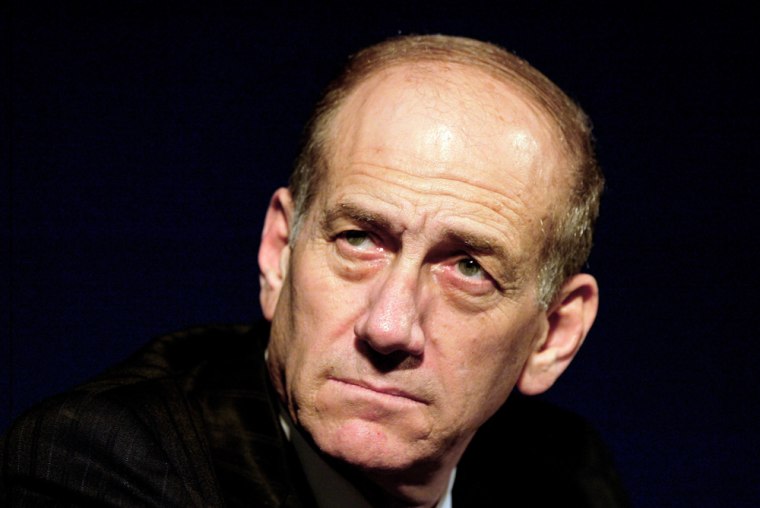Israel will determine its border with the West Bank in the absence of talks with the Palestinians, and then build a wall and move all settlers to the Israeli side, acting Prime Minister Ehud Olmert said in an interview published Friday.
On Thursday Olmert said Israel will draw its final borders by 2010, for the first time setting a deadline for what is expected to be a unilateral large-scale West Bank pullback.
Olmert, in comments carried by the Yediot Ahronot daily Friday, also threatened to assassinate incoming Palestinian Prime Minister Ismail Haniyeh of Hamas if he is involved in terrorism — a threat made Tuesday by Defense Minister Shaul Mofaz.
He said that if there are no peace talks and the Palestinians resume major attacks against Israelis, then the Jewish state will change the path of its security fences that separates Israeli from Palestinian areas. He said that new fence would become Israel’s border with the West Bank.
Negotiations with the Palestinians have long been stalled. With Hamas about to present a new Palestinian government, resumption of stalled peace negotiations appears unlikely.
He told the paper that he would enter into dialogue with settler leaders to try to get them to agree to the new line, moving settlers from outlying areas into settlement blocs he plans to incorporate into Israel.
Dozens of settlements
In the earlier interviews, Olmert said he would keep Gush Etzion and Maaleh Adumim, near Jerusalem, and Ariel, deep in the West Bank, as well as maintaining control over the Jordan River Valley, the line between Jordan and the West Bank.
Even with these areas under Israeli control, the plan would mean a pullout from most of the West Bank and removal of dozens of settlements.
Omert faces election March 28. Polls published Thursday showed Kadima with a wide lead over its two main rivals, the moderate Labor and hawkish Likud. But since the Kadima founder, Prime Minister Ariel Sharon, was felled by a massive stroke Jan. 4, Kadima’s numbers have been slowly dropping.
The latest polls showed Kadima with about 38 seats of the 120 in the parliament, while Labor was winning about 19 and Likud 17.
Trying to shore up the center, Olmert has been outlining a policy that would appeal to dovish Israelis who believe in evacuating much of the West Bank, as well as hawks who favor retaining the Jewish settlements there.
Olmert told Yediot Ahronot he would consult world powers to try to get support for the new border, which would annex parts of the West Bank to Israel. “First of all I will talk to President Bush.” Up to now, the U.S. has opposed unilateral moves.
Asked if he would give an order to assassinate Haniyeh, he replied, “Anyone who is involved in planning terror attacks will be a legitimate target for liquidation,” noting that Israel assassinated Hamas founder Sheik Ahmed Yassin and his successor, Abdel Aziz Rantisi.
With Hamas about to present a new Palestinian government, resumption of stalled peace negotiations appears unlikely.
Haniyeh met with Palestinian President Mahmoud Abbas in Gaza late Thursday. Abbas aide Nabil Abu Rdeneh said Hamas has not completed formation of its government, and Abbas offered an extra two weeks, as Palestinian law provides.
A meeting between Hamas and Abbas’ Fatah also failed to achieve agreement on a joint government, participants said.
Hamas, which has sent dozens of suicide bombers into Israel, does not accept the presence of a Jewish state in the Middle East. Israel considers Hamas a terror group and refuses to talk to its leaders.
Unilateral approach
In the absence of peace talks, Olmert’s unilateral approach is meant as a bold initiative to solve Israel’s main security problems, in the image of Israel’s unilateral pullout from Gaza last summer under Sharon, but he has come under fire from Israeli hawks and doves, as well as Palestinians.
Labor and other dovish parties are sniping at Olmert for undermining efforts to restart peace negotiations, while Likud and other hawks charge that unilateral Israeli pullbacks amount to a reward for Palestinian violence.
Abbas rejected any further unilateral Israeli steps, demanding that future moves should be the result of negotiations.
Abbas, leader of the Fatah Party trounced by Hamas in the January parliamentary vote, was elected separately and has almost three years left in his term.
But Olmert told The Jerusalem Post daily he had no intention of meeting Abbas after Israel’s elections because he sees him as part and parcel of a Palestinian Authority dominated by Hamas.
